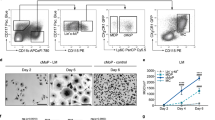Abstract
Proliferation of macrophages in chronic inflammatory loci is an essential part of granuloma development and as such helps to defend the host against dissemination of harmful microorganisms. Its induction seems to depend in part on local appearance of soluble mitogenic factors since sterile cell-free exudates will induce mitotic activity in vitro in a macrophage population otherwise unable to divide. Macrophage proliferation is probably checked and controlled by inherent restrictions on the number of divisions possible. This in turn probably depends on the rapid appearance of gross chromosomal defects, the effete cells being eliminated by their incorporation into multinucleate giant cells which then form non-viable polyploid cells.
Similar content being viewed by others
Author information
Authors and Affiliations
Rights and permissions
About this article
Cite this article
Spector, W.G., Wynne, K.M. Proliferation of macrophages in inflammation. Agents and Actions 6, 123–126 (1976). https://doi.org/10.1007/BF01972195
Issue Date:
DOI: https://doi.org/10.1007/BF01972195




